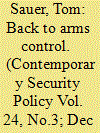| Srl | Item |
| 1 |
ID:
052469


|
|
|
|
|
| Publication |
Dec 2003.
|
| Summary/Abstract |
The article contends that private military contractors supporting American military operations in Iraq will come under intense international scrutiny. Various factors have led to the substantial private presence and the Iraq case reveals shifts in international dynamics from state to private actors. However, the private presence raises concerns that will have to be considered due to the fishbowl qualities of the Iraq case. How the state-contractor relationship is managed will likely have a significant impact upon American policy in Iraq and upon how American military might is perceived, produced, and applied in the future.
Indeed, there are many problems and it is not entirely clear that the United States is prepared to handle the effects stemming from its heavy reliance upon military contractors.
|
|
|
|
|
|
|
|
|
|
|
|
|
|
|
|
| 2 |
ID:
052472


|
|
|
|
|
| Publication |
Dec 2003.
|
| Summary/Abstract |
Since the end of the 1990s, the United States is spending an enormous amount of time, money and energy in developing a workable missile defence system. The Bush administration plans to deploy a couple of missile interceptors in Alaska and California before September 2004. This article assesses different US missile defence scenarios, using four criteria: technological feasibility, cost, threat perception, and strategic stability. Based on these four criteria, we conclude that only a limited US NMD system that is not easily expandable will be acceptable for the other global actors, including Russia, China and Europe. It also requires a multilateral anti-ballistic missile treaty that sets limits to missile defence.
|
|
|
|
|
|
|
|
|
|
|
|
|
|
|
|
| 3 |
ID:
052470


|
|
|
|
|
| Publication |
Dec 2003.
|
| Summary/Abstract |
The extent to which the broadening security agenda should be operationalised by Western military forces is unclear. Prompted by events in Afghanistan during October 2001 and the trend towards regime change and reconstruction, this article uses the notion of civil society as a means to explore the implications of using developmental objectives to shape operations. It argues that civil society's limited utility is most evident when it is applied to urban conflict. Nevertheless, civil society is a significant indicator of trends that may yet shape strategic guidance. This raises questions about the nature and role of military force in the contemporary world, and, indeed, of the new security agenda itself.
|
|
|
|
|
|
|
|
|
|
|
|
|
|
|
|
| 4 |
ID:
052468


|
|
|
|
|
| Publication |
Dec 2003.
|
| Summary/Abstract |
The article analyzes what the European Security and Defence Policy means for Switzerland's security policy and the Swiss Armed Forces. We assume that in the long run, 'Europe' and the 'European cause' will be the strongest sources for legitimizing the use of force and for beefing up military budgets. However, as no country is able to raise the necessary financial resources on its own, European states will have to find new, innovative ways of pooling their resources and devising concepts of role specialization. The overall consequences of these developments will require politicians and military planners to focus more strongly on the strategic adaptability of the country's armed forces rather than on optimising reform at the operational level. We highlight the consequences for Switzerland by addressing the issue of forging strategic partnerships, adapting armament procurement and overhauling security and military planning processes.
|
|
|
|
|
|
|
|
|
|
|
|
|
|
|
|
| 5 |
ID:
052471


|
|
|
|
|
| Publication |
Dec 2003.
|
| Summary/Abstract |
Over the years the basic aims and objectives of the US missile defence shield have witnessed considerable modifications and enlargement. The present emphasis is on developing the 'multilayered defence' concept that encompasses all the three major phases of an attacking ballistic missile. It is not difficult to foresee that the layered defence concept is but a step towards evolving worldwide security architecture of the future that will obviously have major strategic implications globally.
|
|
|
|
|
|
|
|
|
|
|
|
|
|
|
|